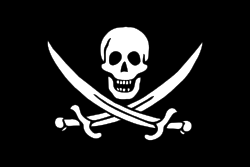In other posts I spoke about the chaos of copyright rules and about e-books, pirated or not, that can be downloaded for free from the Internet. In this post I am going to add a few of my ideas in this regard.
- Just
now, the European Union and the United States apply the rule that copyright lasts up to 70 years after the author's death,
or almost three generations. As authors often die now at quite advanced
ages, that means that the rights to their books last until the fourth or
fifth generation after their own. I doubt that great-great-grandchildren
and their children should continue to collect royalties for what their
remote ancestor did?
- It
is clear that the objective of such long
duration is not to benefit authors, but publishers, many of
which are very powerful, dominate mass media, and use them to pressure
governments to extend the duration of copyright to their benefit, up to
about a century. I think this is an abuse; governments should not have
given in to these pressures. In my opinion copyright should disappear, at
the latest, 25 years after the death of the author.
Let's see what are the costs of publishing
a book in the case of books on paper:
- On
the one hand, there are fixed costs,
which do not depend on the number of pages or the number of copies of the
book, such as the cost of the administration of the publisher, the
freehand payment to the illustrator (if any), and so on. Let's call it x.
- On
the other hand, there are variable costs:
paper, ink, amortization of printing machines, revision and layout of the
text, composition, storage, and so on. We will call y at the
cost per page of the book.
- The
total cost of the book will
be approximately equal to C = x+y.n.p, where n is the number
of copies printed and p is the number of pages in the book.
- The
retail price of the book is
usually calculated as six times the cost per copy, i.e. P = 6.C/n. This
price is usually distributed as follows:
- The
final seller (the bookseller) gets 30%
- Distribution
(the carrier) get 20%
- The
author gets 10%
- The
publisher gets the remaining 40%. As the publisher usually advances the
cost of manufacturing the book (17%, as indicated above), the publisher's
profit usually equals 23%
Let's take an example: suppose that a book
published on paper has p=225 pages, that the print run is n=2000 copies, and
that the retail price of each copy is equal to $21. Therefore, the approximate
cost of one copy is about $3.50, which means that the total cost will be C=2000.P/6=$1167.
In the case of electronic books, all costs are fixed, as just one copy needs to
be produced. Any e-book sold is just an electronic copy from the original.
Therefore, there is no storage cost. On the other hand, the author is frequently
responsible of the layout of the book and its composition, and sometimes must even
provide the book in a standard electronic format, such as epub, therefor a
large part of the fixed costs also disappears.
It is clear that the total cost of a book in electronic format is much lower
than that of the same book on paper. Some companies, such as
Amazon, allow self-publishing of books in paper (for print-on-demand) and in
digital format. The cost for one copy of a 225-page book on paper can be about $3.60,
while in electronic format the cost is zero, for whoever provides the book delivers
it with a perfect layout, ready for distribution.
Although some publishers lower significantly
the price of e-books compared to books on paper, others charge almost the
same price in both cases. I don’t think this is fair play. When the
price of a paper book is $20 and the e-book is charged $18, the publisher may
be cheating the buyer of the electronic book. I also think that when someone has
bought a book on paper, they should be entitled to receive the same book in
electronic format for free.
For these and other reasons, I believe that
the offering and downloading of free e-books via the Internet should be allowed
in the following cases:
- When
the book is no longer subject to copyright,
because the legal time has passed. (This is already in effect).
- When
the paper book is out of print,
and is not being sold in digital format. (In other words, when it can’t be
got in other ways).
- When
the paper book has been bought
or was previously owned.
- When
the price of the electronic book by a
publisher is abusive. Limits should be set for these prices.
I believe that the price of an e-book shouldn’t exceed one half of the
price of the book on paper.


No comments:
Post a Comment